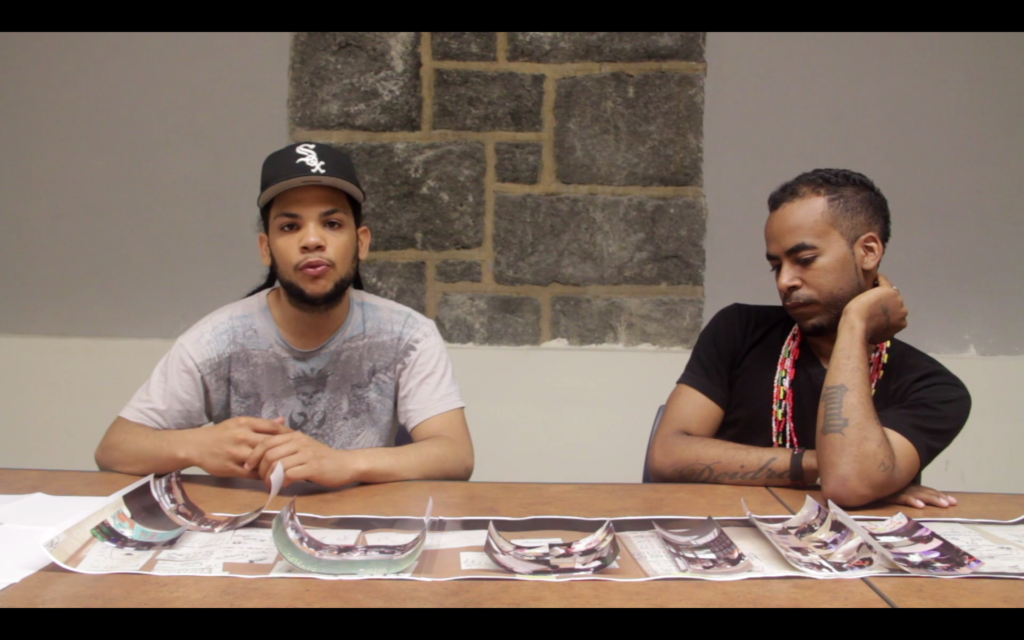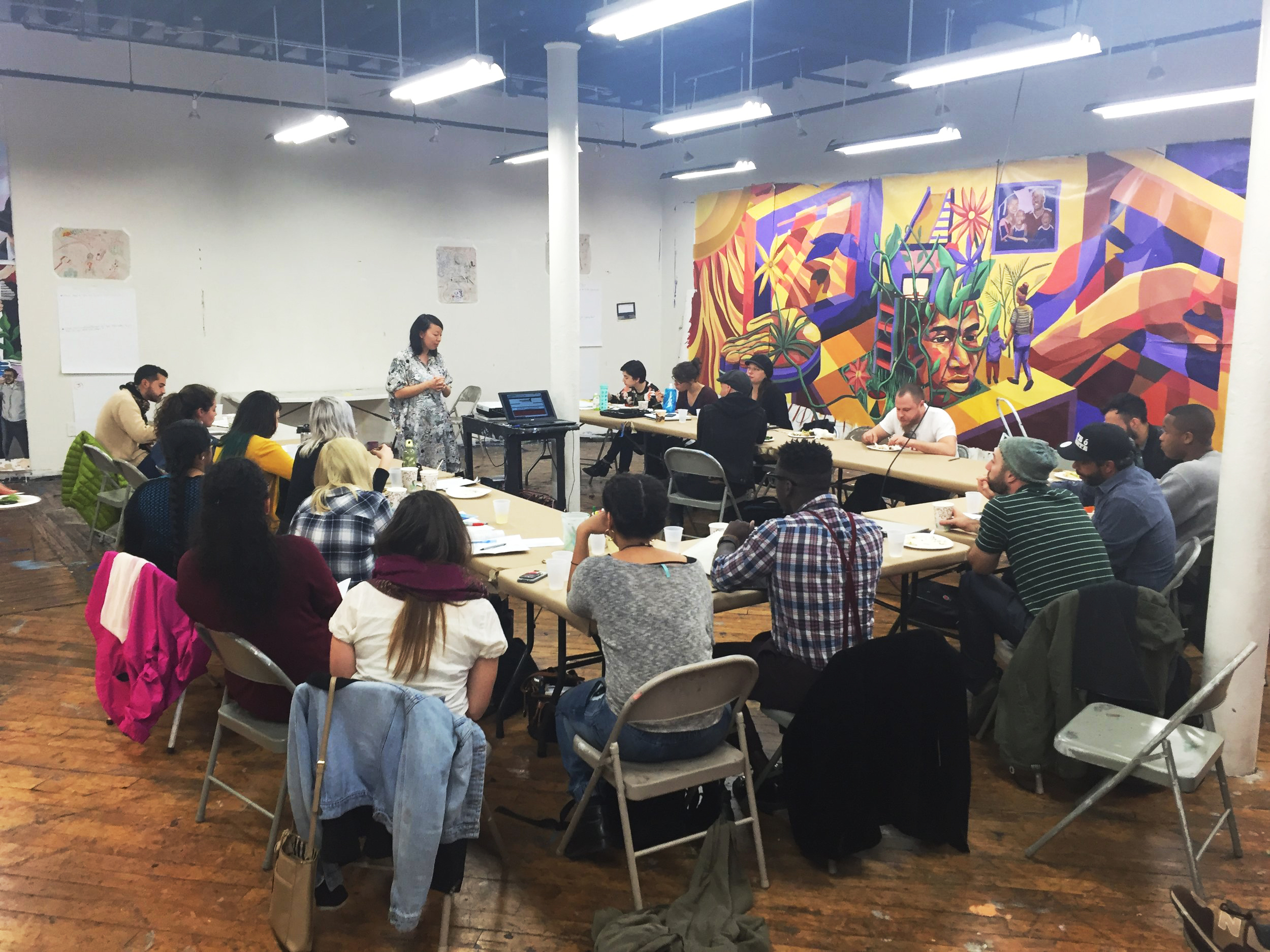In 2014, the Collaboratory established a Community of Practice that included 48 participants (including faculty, external partners, and research assistants) and reflected a wide constellation of programs including Media Studies, Food Studies, History, Anthropology, Sociology, Psychology, Transdisciplinary Design, Arts, Media and Technology, and Management, among others. Together the community of practice established a learning agenda that guided an action research project across a set of seven collaborative projects. Each of the six project partnerships examines and tests new approaches to creating a more just, resilient, and equitable society, including strategies that also advance innovation in socially engaged, problem-focused learning and public scholarship with external partners and communities.
The intent of the research has been to discover challenges to creating enduring partnerships and articulate them as areas of opportunity for organizational change that would enable the University and diverse partners to improve the practice in regard to public engagement and socially engaged education. The research design drew upon ethnographic, design, and organizational change methodologies.

Through a cross-cutting analysis of a set of projects, the Collaboratory produced a report that identified some of the challenges of and best practices for collaboration from the perspectives of all stakeholders, including communities, institutional partners, students, and faculty. The report also identified opportunities for The New School to enhance institutional support for engaged learning and public scholarship.
The projects provided a unique opportunity to learn about how The New School collaborates at a process-based level. The interdisciplinary teams of designers, artists, curators, filmmakers, and social scientists combined with a wide array of students, community groups, citizens and other organizations constitute a fairly complex assemblage of skills, perspectives, interests, histories, goals, and desires. To track how these various stakeholders work together, how they share knowledge and skill sets, and how they present differing approaches to community engagement and social innovation is an invaluable opportunity to study emergent forms of collaboration as they unfold. The complex problems of today require networked, interdisciplinary forms of knowledge to be solved. As The New School affirms its commitment to being an active player in promoting transformative change in New York City and beyond, it is important to gain a more nuanced understanding of how such complex endeavors work.
This is the outcome of qualitative research conducted by Collaboratory researchers between January and July 2014 across seven project partnerships. The report provides an analysis of the challenges and some emergent best practices identified across these case studies. In brief, the findings include:
- There is a strong desire for tools and systems that can be used so that each partnership does not have to start from scratch. Faculty are seeking ways to promote best practices that are flexible enough to allow partnerships to exist on a variety of scales, among diverse groups, and aimed at diverse ends.
- Students of The New School are excited by opportunities to work with outside partners in local communities. Such opportunities allow students to develop and refine new skills in a real-world setting, extend their own professional networks, and do work that matters to them personally. However, students find that there are a number of practical barriers to pursuing these opportunities. Students feel that it is difficult to find such courses, that course learning objectives and activities tend to be unclear, that courses sometimes focus too much on building rudimentary skills, and that there are few opportunities to continue working with community partners after the course of a semester.
- While faculty engaged in the Collaboratory are proud of their socially engaged teaching, scholarship, and practice, they feel insufficiently supported by the University in pursuing this work. At present there is a paucity of institutional or peer-driven means for faculty to find professional development or other support for such work. Faculty also feel that the time-consuming nature of working with outside partners is not taken into account in workload decisions. Adding to this challenge, publicly engaged work is not seen as fully valued in promotion and tenure review.
- Faculty and external partners view the University as lacking the institutional infrastructure and resources to support complex, publicly engaged partnerships. While faculty and external partners would like more institutional support, they are also wary of standardization of approaches to social engaged education and scholarship. As The New School considers how it can further support publicly engaged education, care should be taken to preserve the diversity of forms and scales of publicly engaged projects.
While the report focuses on the challenges of public engagement, it is clear that the Collaboratory projects are evolving in exciting ways and, while still at an early stage, are achieving recognition and interest in new contexts. They are a testament to the meaningful work that faculty, students, and partners can co-create when given the opportunity to develop sustained initiatives to address complex social justice and sustainability issues. We hope our interpretations adequately reflect what we observed, read, and heard from these dedicated and creative individuals. We also hope that this research will contribute to enhancing The New School’s ability to support these types of efforts more broadly.
Future Provocations Arising from this Research:
Student Experience and Curricula
- How might we design curricula, course plans, and course offerings such that they align and balance stakeholder goals, educational goals, and the capacities and motivations of students?
- How might we redesign the trajectory of student experience so that their capacity to work with communities is developed incrementally and reflexively throughout various forms and scales of public engagement?
- How might we make the student capacity to co-create change with communities a more significant aspect of learning goals across University schools and divisions?
Teaching, Scholarship & Faculty Affairs
- How might we develop new forms of faculty development to include capacity for creating and managing collaborations that are interdisciplinary and focused on social justice and sustainability outcomes?
- How might we better support the faculty committed to socially engaged work, tenure-track or otherwise, so that their work is visible and valuable as central part of scholarship, service and pedagogy?
- What forms of compensation might we develop to better account for the time consuming work of civic engagement that faculty produce while in the university community, regardless of their title or standing in their professional career?
Practices of External Engagement
- How might we design systems to turn dispersed, tactical, ad hoc knowledge developed in the course of collaboration into strategic knowledge and institutional memory that will be useful in the future to diverse stakeholders including students, faculty, partners, and community members?
- How might we develop tools and systems that are flexible enough to enable scaling, sustaining and/or replicating desirable aspects or outcomes of projects, but do not standardize the practice of organizing outside collaborations?
- How might we sustain peer-learning and nurture a community of practice across diverse modes and scales of social engagement, so that smart practices and solutions can spread and no project is alone in challenging times?
- How might we design methods of assessing the impact of external engagements in partner organizations and communities?
Administration & Operations
- How might we create specific administrative, legal, financial, and operational, tools that would ease the temporal and logistical burdens of creating sustainable external partnerships?
- How might we construct new kinds of roles for external collaborators in the University such that they are recognized as equal co-partners, co- learners, co-public scholars, and co-educators?

